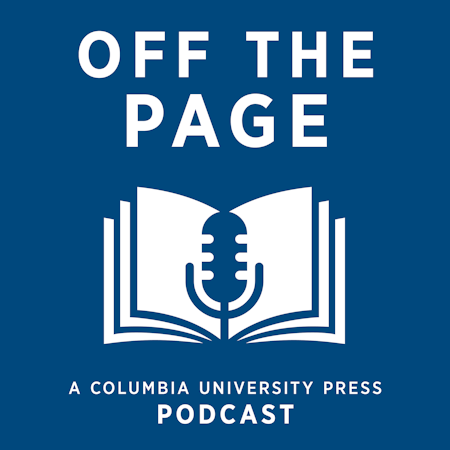
Off the Page: A Columbia University P...
Interviews with Columbia University Press authors.
276
Robert Snyder, "All the Nations Under Heaven: I...
An Interview with Robert Snyder
25 min
277
Herbert Terrace, "Why Chimpanzees Can't Learn L...
An interview with Herbert Terrace
56 min
278
Richard Kearney, "Touch: Recovering Our Most Vi...
An interview with Richard Kearney
62 min
279
Richard Jean So, "Redlining Culture: A Data His...
An Interview with Richard Jean So
43 min
280
David Brophy, "In Remembrance of the Saints: Th...
An interview with David Brophy
64 min
281
Laura Moretti, "Pleasure in Profit: Popular Pro...
An interview with Laura Moretti
54 min
282
Daniel Poch, "Licentious Fictions: Ninjō and th...
An interview with Daniel Poch
58 min
283
Eric Hayot, "Humanist Reason: A History. An Arg...
An interview with Eric Hayot
86 min
284
Steven Collins, "Wisdom as a Way of Life: Thera...
An interview with Steven Collins
52 min
285
Xiaomei Chen, "Staging Chinese Revolution: Thea...
An interview with Xiaomei Chen
52 min
286
Han Yu, "Mind Thief: The Story of Alzheimer's" ...
An interview with Han Yu
69 min
287
Nira Wickramasinghe, "Slave in a Palanquin: Col...
An interview with Nira Wickramasinghe
63 min
288
Debashree Mukherjee, "Bombay Hustle: Making Mov...
An interview with Debashree Mukherjee
40 min
289
Lucy Alford, "Forms of Poetic Attention" (Colum...
An interview with Lucy Alford
69 min
290
Nicholas Jepson, "In China's Wake: How the Comm...
An interview with Nicholas Jepson
61 min
291
Michael Christo Low, "Imperial Mecca: Ottoman A...
An interview with Michael Christo Low
88 min
292
Jeffrey B. Perry, "Hubert Harrison: The Struggl...
An interview with Jeffrey B. Perry
71 min
293
Bruce Haynes, "Down the Up Staircase: Three Gen...
An interview with Bruce Haynes
60 min
294
Guojun Wang, "Staging Personhood: Costuming in ...
An interview with Guojun Wang
62 min
295
K. Mistry and H. Gurman, "Whistleblowing Nation...
An interview with Kaeten Mistry and Hannah Gurman
63 min
296
T. Maschi and K. Morgen, "Aging Behind Prison W...
Interview with Tina Maschi
60 min
297
Thomas Doherty, "Little Lindy Is Kidnapped: How...
An interview with Thomas Doherty
75 min
298
William C. Hedberg, "The Japanese Discovery of ...
An interview with William C. Hedberg
44 min
299
Arie Perliger, "American Zealots: Inside Right-...
An interview with Arie Perliger
58 min
300
Peter Maguire and Mike Ritter, "Thai Stick: Sur...
An interview with Peter Maguire
58 min